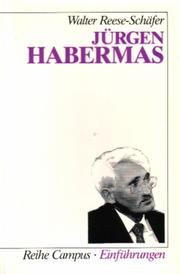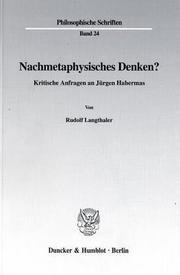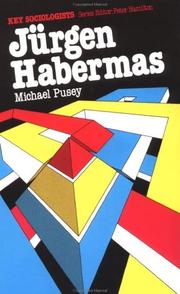| Listing 1 - 10 of 160 | << page >> |
Sort by
|

ISBN: 359334484X Year: 1991 Publisher: Frankfurt Campus
Abstract | Keywords | Export | Availability | Bookmark
 Loading...
Loading...Choose an application
- Reference Manager
- EndNote
- RefWorks (Direct export to RefWorks)
Habermas, Jürgen --- Habermas, Jurgen --- Habŏmasŭ, Wirŭgen --- Habŏmasŭ --- Khabermas, I︠U︡. --- Khabermas, I︠U︡rgen --- Ha-pei-ma-ssu, Yu-erh-ken --- Habeimasi --- הברמאס, יורגן --- יורגן הברמס --- 哈贝马斯 --- Habermas, Jürgen. --- Habermas, Jürgen. --- Habermas, Jürgen

ISBN: 3428089391 Year: 1997 Volume: 24 Publisher: Berlin Duncker & Humblot
Abstract | Keywords | Export | Availability | Bookmark
 Loading...
Loading...Choose an application
- Reference Manager
- EndNote
- RefWorks (Direct export to RefWorks)
Habermas, Jurgen --- Habŏmasŭ, Wirŭgen --- Habŏmasŭ --- Khabermas, I︠U︡. --- Khabermas, I︠U︡rgen --- Ha-pei-ma-ssu, Yu-erh-ken --- Habeimasi --- הברמאס, יורגן --- יורגן הברמס --- 哈贝马斯 --- Habermas, Jürgen --- Habermas, Jürgen. --- Habermas, Jürgen. --- Habermas, Jürgen
Book
ISBN: 9781107172029 9781316771303 9781316623206 1316772209 1316774376 131677130X 1107172020 Year: 2019 Publisher: New York : Cambridge University Press,
Abstract | Keywords | Export | Availability | Bookmark
 Loading...
Loading...Choose an application
- Reference Manager
- EndNote
- RefWorks (Direct export to RefWorks)
Over a career spanning nearly seven decades, Jurgen Habermas - one of the most important European philosophers of the twentieth and twenty-first centuries - has produced a prodigious and influential body of work. In this Lexicon, authored by an international team of scholars, over 200 entries define and explain the key concepts, categories, philosophemes, themes, debates, and names associated with the entire constellation of Habermas's thought. The entries explore the historical, philosophical and social-theoretic roots of these terms and concepts, as well as their intellectual and disciplinary contexts, to build a broad but detailed picture of the development and trajectory of Habermas as a thinker. The volume will be an invaluable resource for students and scholars of Habermas, as well as for other readers in political philosophy, political science, sociology, international relations, cultural studies, and law.
Habermas, Jürgen --- Habŏmasŭ, Wirŭgen --- Habŏmasŭ --- Khabermas, I︠U︡. --- Khabermas, I︠U︡rgen --- Ha-pei-ma-ssu, Yu-erh-ken --- Habeimasi --- הברמאס, יורגן --- יורגן הברמס --- 哈贝马斯
Book
ISBN: 0231166427 0231535880 9780231535885 9780231166423 Year: 2018 Publisher: New York, NY : Columbia University Press,
Abstract | Keywords | Export | Availability | Bookmark
 Loading...
Loading...Choose an application
- Reference Manager
- EndNote
- RefWorks (Direct export to RefWorks)
Jürgen Habermas is one of the most influential philosophers of our time. His diagnoses of contemporary society and concepts such as the public sphere, communicative rationality, and cosmopolitanism have influenced virtually all academic disciplines, spurred political debates, and shaped intellectual life in Germany and beyond for more than fifty years. In The Habermas Handbook, leading Habermas scholars elucidate his thought, providing essential insight into his key concepts, the breadth of his work, and his influence across politics, law, the social sciences, and public life.This volume offers a comprehensive overview and an in-depth analysis of Habermas's work in its entirety. After examining his intellectual biography, it goes on to illuminate the social and intellectual context of Habermasian thought, such as the Frankfurt School, speech-act theory, and contending theories of democracy. The Handbook provides an extensive account of Habermas's texts, ranging from his dissertation on Schelling to his most recent writing about Europe. It illustrates the development of his thought and its frequently controversial reception while elaborating the central ideas of his work. The book also provides a glossary of key terms and concepts, making the complexity of Habermas's thought accessible to a broad readership.
Philosophy. --- Sociology --- Mental philosophy --- Humanities --- Habermas, Jürgen. --- Habermas, Jürgen --- Habŏmasŭ, Wirŭgen --- Habŏmasŭ --- Khabermas, I︠U︡. --- Khabermas, I︠U︡rgen --- Ha-pei-ma-ssu, Yu-erh-ken --- Habeimasi --- הברמאס, יורגן --- יורגן הברמס --- 哈贝马斯 --- Philosophy
Book
ISBN: 3882090219 Year: 1984 Publisher: Hannover Soak-Verlag
Abstract | Keywords | Export | Availability | Bookmark
 Loading...
Loading...Choose an application
- Reference Manager
- EndNote
- RefWorks (Direct export to RefWorks)
#gsdbf --- Habermas, Jürgen. --- Habermas, Jürgen --- Habŏmasŭ, Wirŭgen --- Habŏmasŭ --- Khabermas, I︠U︡. --- Khabermas, I︠U︡rgen --- Ha-pei-ma-ssu, Yu-erh-ken --- Habeimasi --- הברמאס, יורגן --- יורגן הברמס --- 哈贝马斯 --- Habermas, Jürgen
Book
ISBN: 1438453884 9781438453880 9781438453873 1438453876 Year: 2014 Publisher: Albany : State University of New York Press,
Abstract | Keywords | Export | Availability | Bookmark
 Loading...
Loading...Choose an application
- Reference Manager
- EndNote
- RefWorks (Direct export to RefWorks)
Winner of the 2016 Outstanding Scholarly Work Award for the School of Humanities presented by Ateneo de Manila UniversityThis book is a pioneering study of Philippine democracy, one of the oldest in the Asian region, vis-à-vis Habermasian critical theory. Proceeding from a concise examination of the theory of law and democracy found in Habermas's Between Facts and Norms, Ranilo Balaguer Hermida explains how the law occupies the central role in both the legitimation of political power and the attainment of social integration. He then discusses how Habermas proposes to resolve the tension that exists in modern society between democratic norms and social facts, through the adoption of a lawmaking procedure whereby the informal sources of issues and opinions from the public sphere are allowed to develop and interact with the formal deliberations and decision processes inside the political system. He also explores certain provisions of the present Philippine Constitution that were expressly intended to restore democratic institutions and processes destroyed by decades of martial law, as well as the problems and hindrances that stand in the way of their full implementation.
Democracy --- Philosophy. --- Habermas, Jürgen. --- Habermas, Jürgen --- Habŏmasŭ, Wirŭgen --- Habŏmasŭ --- Khabermas, I︠U︡. --- Khabermas, I︠U︡rgen --- Ha-pei-ma-ssu, Yu-erh-ken --- Habeimasi --- הברמאס, יורגן --- יורגן הברמס --- 哈贝马斯 --- Philippines --- Politics and government.

ISBN: 1134847874 1134847882 1280320230 0203425812 020329971X 9780203299715 9780203425817 9781134847884 9781134847839 9781134847877 9781138834101 9780415104517 Year: 1987 Publisher: Chichester [West Sussex] : London ; New York : E. Horwood ; Tavistock Publictions,
Abstract | Keywords | Export | Availability | Bookmark
 Loading...
Loading...Choose an application
- Reference Manager
- EndNote
- RefWorks (Direct export to RefWorks)
A lucid and authoritative introduction to the work of Habermas. His sometimes difficult and inaccessible work is rendered accessible by Michael Pusey for the student reader.
Sociologists --- Behavioral scientists --- Social scientists --- Habermas, Jürgen. --- Habermas, Jürgen --- Habŏmasŭ, Wirŭgen --- Habŏmasŭ --- Khabermas, I︠U︡. --- Khabermas, I︠U︡rgen --- Ha-pei-ma-ssu, Yu-erh-ken --- Habeimasi --- הברמאס, יורגן --- יורגן הברמס --- 哈贝马斯 --- Habermas, Jurgen.
Book
ISBN: 147442029X 9781474420297 1474420281 9781474420280 9781474420211 1474420214 9781474420303 1474420303 Year: 2019 Publisher: Edinburgh : Edinburgh University Press,
Abstract | Keywords | Export | Availability | Bookmark
 Loading...
Loading...Choose an application
- Reference Manager
- EndNote
- RefWorks (Direct export to RefWorks)
A critical introduction to Jürgen Habermas’ political thought and his theory of powerCombines sociological and philosophical analysis of Habermas’ work to make sense of his distinctive approach to political theorySituates Habermas’s political theory in relation to Continental theorists – including Benjamin, Schmitt, Foucault, Lefort and Rancière – and current schools of Anglo-American political philosophy – such as anarchism, liberalism and republicanismSurveys of the critical literature at the end of each chapter to provide suggestions for further readingJürgen Habermas has come to be viewed as the unofficial philosopher laureate of the European Union. But why have his contributions to contemporary political theory commanded such attention? This book brings to life the ideas of a unique thinker, an heir to the Enlightenment legacy, a champion of reason and democracy, a social theorist of unusual sophistication and an astute commentator on contemporary politics. Unified by a central focus on the theme of power, the book guides you through the sociological and philosophical perspectives that are essential to Habermas’s political theory. It situates the philosopher’s political thinking in relation to key Continental theorists such as Carl Schmitt and Michel Foucault as well as current debates in Anglo-American political philosophy.
Habermas, Jürgen --- Habŏmasŭ, Wirŭgen --- Habŏmasŭ --- Khabermas, I︠U︡. --- Khabermas, I︠U︡rgen --- Ha-pei-ma-ssu, Yu-erh-ken --- Habeimasi --- הברמאס, יורגן --- יורגן הברמס --- 哈贝马斯 --- Political and social views. --- Political science --- PHILOSOPHY / Political. --- Philosophy. --- Political philosophy
Book
ISBN: 9783896786456 Year: 2008 Publisher: Darmstadt WBG
Abstract | Keywords | Export | Availability | Bookmark
 Loading...
Loading...Choose an application
- Reference Manager
- EndNote
- RefWorks (Direct export to RefWorks)
Habermas, Jürgen --- Philosophers --- Funken, Michael --- Habermas, Jürgen. --- Habermas, Jürgen --- Habŏmasŭ, Wirŭgen --- Habŏmasŭ --- Khabermas, I︠U︡. --- Khabermas, I︠U︡rgen --- Ha-pei-ma-ssu, Yu-erh-ken --- Habeimasi --- הברמאס, יורגן --- יורגן הברמס --- 哈贝马斯
Book
ISBN: 9780826487650 9780826487667 Year: 2010 Publisher: London Continuum
Abstract | Keywords | Export | Availability | Bookmark
 Loading...
Loading...Choose an application
- Reference Manager
- EndNote
- RefWorks (Direct export to RefWorks)
Habermas, Jürgen --- Habermas, Jürgen. --- Habermas, Jürgen --- Habŏmasŭ, Wirŭgen --- Habŏmasŭ --- Khabermas, I︠U︡. --- Khabermas, I︠U︡rgen --- Ha-pei-ma-ssu, Yu-erh-ken --- Habeimasi --- הברמאס, יורגן --- יורגן הברמס --- 哈贝马斯
| Listing 1 - 10 of 160 | << page >> |
Sort by
|

 Search
Search Feedback
Feedback About UniCat
About UniCat  Help
Help News
News